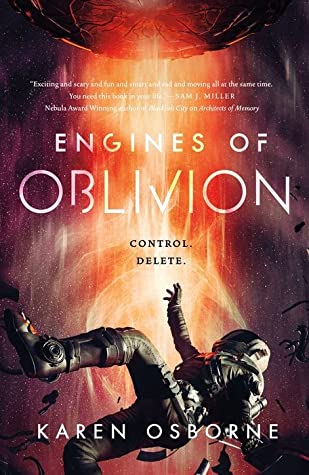Rating: 9/10
Synopsis
Natalie Chan gained her corporate citizenship, but barely survived the battle for Tribulation.
Now corporate has big plans for Natalie. Horrible plans.
Locked away in Natalie’s missing memory is salvation for the last of an alien civilization and the humans they tried to exterminate. The corporation wants total control of both—or their deletion.
Review
Engines of Oblivion is the second and final installment in The Memory War duology by Karen Osborne, and I was even more impressed with this one than I was the first. It is just as dark and mysterious as Architects of Memory (the first installment in the series, check out that review here), but with even more twists and a deeper look into the alien technology the series is based on. Answers, I tell you. We get answers.
The first thing I think it is important to point out is that this book changes main character points of view from the first. In Architects, Ash is the main and the reader experiences everything from her point of view; whereas, in Engines Natalie is the main protagonist. I find this switch to be absolutely fascinating, due to the difficulty level. This series in and of itself is complex, and then to make this kind of change is crazy to me. Crazy like a fox (I think I used that saying wrong, but you get the picture). Because Osborne absolutely pulls it off. Ash is still a player in book 2; in fact, she continues to play a really important role. It is just that the reader does not follow her around. There is a reason for that, and in my opinion it absolutely makes sense. It is just something that I, as a writer, would never have considered. The fact that this is a boon to the story as opposed to a detriment is a nod to Osborne’s writing. Only an incredibly skilled author could do this successfully, and Karen Osborne has officially climbed that mountain.
Not that the author necessarily needed to do that to show off her writing aptitude, because the narrative of The Memory War series is intricate enough to make that claim. The tracks of this story are far from parallel, twisting into each other often enough that I had to stop and recalibrate every once in a while. I love a story that makes me do this because it keeps me interested as my brain constantly has to churn. In my review of Architects I mentioned how I felt like every page was an opportunity for a new discovery in this book, but Osborne took it to the next level in Engines. My favorite aspect of the book is just how mysterious it all is. From the opening scene in Architects all the way through to the last page of Engines, a dark shroud surrounds the plot, keeping its secrets. The deeper the reader goes, the heavier it gets and the more reality has to be suspended. The aliens and their technology in question are different from humanoids or even other aliens we have read about in so many ways. A little advice: come in to Engines eyes wide open and ready for anything, because the way Architects leaves off there is so much story left to tell, and the author is determined to answer all the questions while also creating more questions along the way and answering those, as well.
I found the subtext of the narrative to be very thought-provoking. The humans and aliens end up in a few chicken-and-egg situations that make the reader think about our respective places in the world. What does it all mean? And how might it mean something different to another sentient species? Themes of capitalism (and anti-capitalism), slavery, agency, and corporate greed abound. These topics are heavily broached in the series overall, but come to a head in Engines. Sometimes they are in the background, but often are brought to the foreground and can be very obtuse. In my opinion, these themes add to depth of the book because they are a factor in every action taken by every character in the book.
I thoroughly enjoyed Engines of Oblivion. It is a fabulous ending to a unique and compelling series. Fans of The Expanse will enjoy its dark, spacey tone.





Leave a Reply